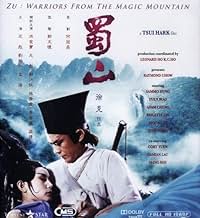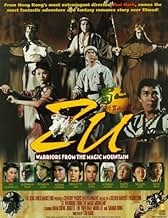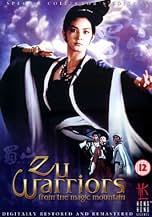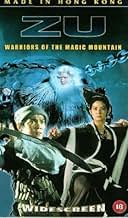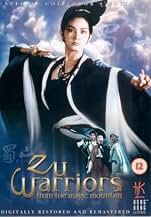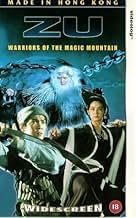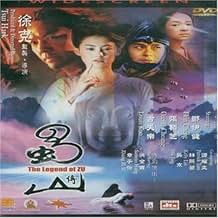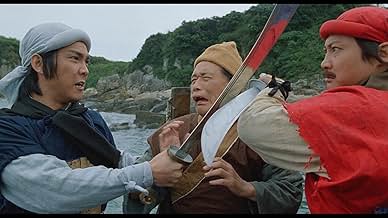IMDb RATING
6.6/10
3.3K
YOUR RATING
A Chinese soldier in an ancient civil war flees the battlefield and gets caught up in a fantastical quest to save the world from evil.A Chinese soldier in an ancient civil war flees the battlefield and gets caught up in a fantastical quest to save the world from evil.A Chinese soldier in an ancient civil war flees the battlefield and gets caught up in a fantastical quest to save the world from evil.
- Awards
- 5 nominations total
Fung Hak-On
- Evil Disciple
- (as Hark-On Fung)
Kuang-Li Hsia
- Chi Wu-Shuang
- (as Kwan-Li Shen)
- Director
- Writers
- All cast & crew
- Production, box office & more at IMDbPro
Featured reviews
This eye-popping, special-effects-laden Asian fantasy is a real feast for the eyes. It stars Yuen Biao as a soldier who, fed up with the constant and seemingly pointless civil war, deserts his platoon only to find himself caught in another battle. He escapes the battle by falling off a cliff, but descends unharmed into a cave, where he is rescued from an attack by glow-eyed flying demons by a fantastic warrior with a magical flying sword. He goes under the tutelage of the warrior, who is reluctant to take on a new pupil. What follows, words cannot aptly describe. Suffice it to say, it's an absolutely frenzied mix of action, special effects and bizarre, magical occurrences. The action is non-stop and the editing is laser-paced. I was absolutely exhausted by the end of the film. The cast is likewise first-rate. I was impressed especially by Sammo Hung in a dual role: as Yuen Biao's soldier buddy, and as Long Brows, the ancient priest who holds the Blood Monster at bay using his "sky mirror" and magical extending beard and eyebrows...You'd have to see it to understand. Suffice to say that there's many moments in this film that will have you thinking, "I have no idea what's going on, but it sure *looks* cool." Trust me, you won't be able to tear your eyes from the screen.
Hark's action fantasy 'Xin Shu Shan Jian Ke' is a whole lot of fun. Needless to say one can expect lots of extravagant martial arts action sequences which are well choreographed (but some of them are so long that they tend to drag a little). The movie is loaded with special effects and even though they don't look as refined as movies of today, they're still fun to watch. The sets don't look particularly authentic but they hold a certain appeal and I like the way they appeared. The story isn't told in the traditional fashion and at some points question marks will appear in the mind but there's always something happening to keep the viewer engaged. Yuen Biao and Sammo Hung are simply great as they infuse humour and energy into their roles. Energetic, funny, bizarre, wacky, magical...these are just a few words that describe Tsui Hark's 'Xin Shu Shan Jian Ke'. Forget the abysmal 2003 remake. This is where the real fun is.
I've got to say, this movie delivered exactly what I thought it would when I bought it. And I bought it simply on the strength of the box and how it said something really good about Tsui Hark. Ever since I have unfailingly watched any Tsui Hark movie that has come across my path. I love this movie. It's goofy in the extreme and at many points simply doesn't make sense. Maybe it's because I've been brainwashed by too many episodes of Mystery Science Theater 3000, but I love cheesy movies. The fight scenes are excellent, the scenery is superb and the story is spellbinding, (there I think I've but exhausted my list of critic cliché adjectives). It's especially good to watch if you're an enhancement smoker.
"Zu Warriors" certainly pushed wuxia to its limits; it has such a relentless air of enthusiasm, especially given its limited budget, that its incredibly easy to dismiss any faults it does have just because of its overwhelmingly extravagant nature. Its glorious, vivid production design and intentionally camp attitude makes it very difficult not to be totally drawn into its colourful images while completely forgetting the film has a plot.
Tsui Hark has included just about everything in this one. The special effects may not be up to much but that is a sideline; the wonderful swordplay starts almost immediately and the films rarely lets up as it jumps from one operatic martial art display to another, helped by an impeccable cast featuring iconic stars such as Sammo Hung and Brigitte Lin.
Unfortuantly it still took some work before films of this sort were appreciated in the west. Despite the efforts of John Carpenter, it still took over a decade and Crouching Tiger to truly bring this wonderful form of entertainment to the masses. There's only so much praise you can give a film before saying it has to be seen to be appreciated fully. This is certainly a landmark in wuxia and an essential showpiece of Hong Kong action at its finest. (A testament to this is the fact the DVD has a Bey Logan commentary.)
Tsui Hark has included just about everything in this one. The special effects may not be up to much but that is a sideline; the wonderful swordplay starts almost immediately and the films rarely lets up as it jumps from one operatic martial art display to another, helped by an impeccable cast featuring iconic stars such as Sammo Hung and Brigitte Lin.
Unfortuantly it still took some work before films of this sort were appreciated in the west. Despite the efforts of John Carpenter, it still took over a decade and Crouching Tiger to truly bring this wonderful form of entertainment to the masses. There's only so much praise you can give a film before saying it has to be seen to be appreciated fully. This is certainly a landmark in wuxia and an essential showpiece of Hong Kong action at its finest. (A testament to this is the fact the DVD has a Bey Logan commentary.)
Set during a feudal period with many warring clans, Yuen Biao stars as a young warrior who deserts his army and , after falling off of a cliff, finds himself in a magical land in the middle of its own war. The forces of Good, lead by the ancient sorcerer White Brows (Sammo Hung), are at odds with the forces of Evil, lead by the Blood Demon (Corey Yuen). Biao teams up with a group of heroic warriors, including Adam Cheng and Brigitte Lin, to help defeat the evil menace.
Filled with bizarre characters (White Brows fights with his extendable eyebrows!) and dazzling, if primitive, special effects, this film is a non-stop feast for the eyes. It maintains a light tone for the most part, and the choreography, which utilizes a lot of "wire-fu", is spectacular. It has a low budget (for American audiences, anyway) can-do feel, and a lot of the effects are done with in-camera trickery that is quite clever.
The script is convoluted, the way a lot of kung-fu epics are, and there are times when you aren't quite sure who is who and what is what. Some of this I blame on the DVD I watched, a poor quality edition from a Chinese distributor, with a shoddy English-dubbed audio track. If someone were to put this out on a re-mastered Blu Ray, I would buy it in a second. Highly recommended for martial arts fans, and fans of weird world cinema.
Filled with bizarre characters (White Brows fights with his extendable eyebrows!) and dazzling, if primitive, special effects, this film is a non-stop feast for the eyes. It maintains a light tone for the most part, and the choreography, which utilizes a lot of "wire-fu", is spectacular. It has a low budget (for American audiences, anyway) can-do feel, and a lot of the effects are done with in-camera trickery that is quite clever.
The script is convoluted, the way a lot of kung-fu epics are, and there are times when you aren't quite sure who is who and what is what. Some of this I blame on the DVD I watched, a poor quality edition from a Chinese distributor, with a shoddy English-dubbed audio track. If someone were to put this out on a re-mastered Blu Ray, I would buy it in a second. Highly recommended for martial arts fans, and fans of weird world cinema.
Did you know
- TriviaAmerican filmmaker John Carpenter has stated that Zu: Warriors from the Magic Mountain (1983) was an influence on his 1986 film Big Trouble in Little China (1986).
- GoofsDuring many of the actors stunt scenes or where there are arrows flying around, you can spot the cables used by the sfx team.
- Alternate versionsThe international English language version, Zu Time Warriors, includes a 25-min. wraparound filmed in Canada with Yuen Biao as a modern day fencing champ transported via his dreams while in a coma to the Oriental fantasy setting of the film and awakening from the coma at the end. The Chinese version was released prior to this filming despite director's wishes.
- ConnectionsFeatured in The Best of the Martial Arts Films (1990)
Details
- Release date
- Country of origin
- Language
- Also known as
- Warriors from the Magic Mountain
- Production company
- See more company credits at IMDbPro
Contribute to this page
Suggest an edit or add missing content


